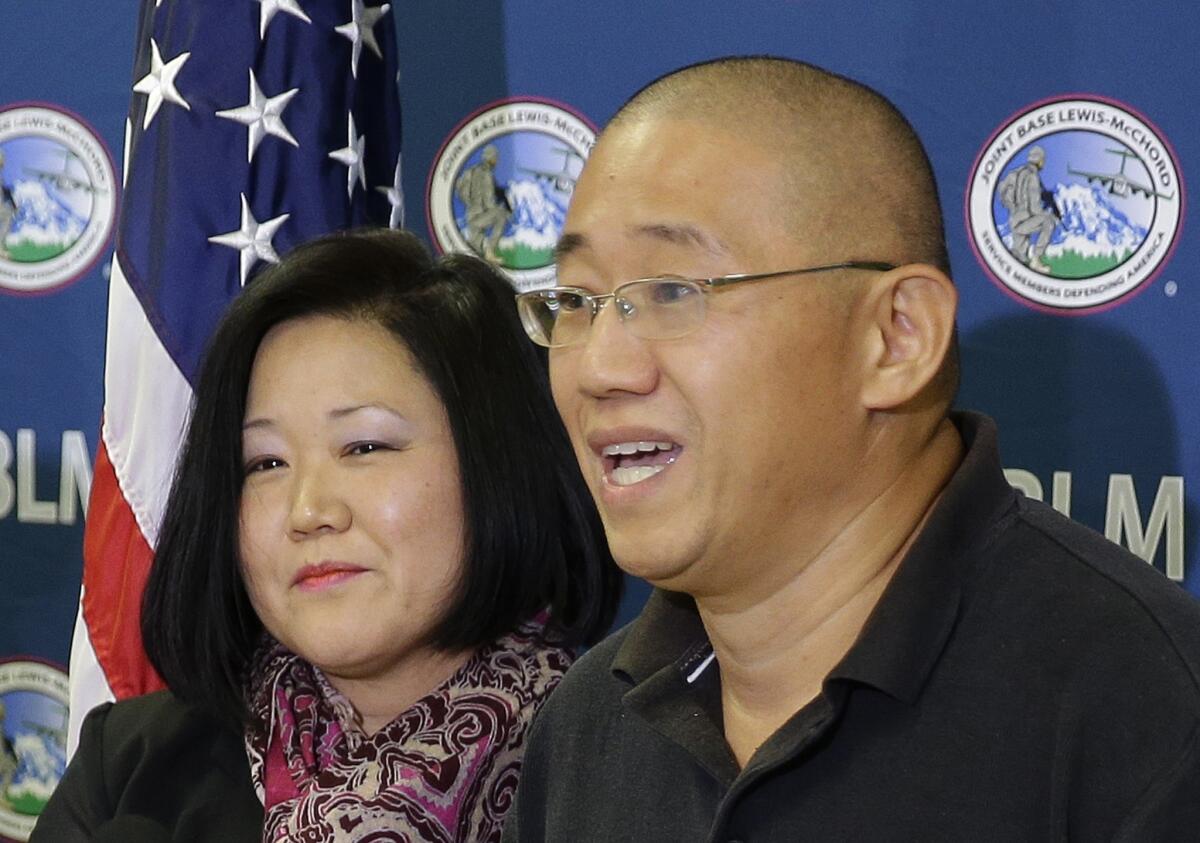Freed by North Korea, Americans Bae and Miller return to U.S.

- Share via
Reporting from Washington, D.C. — Two Americans detained in North Korea were freed and brought home to the United States on Saturday, the result of a surprising move by the reclusive nation that may signal a shift in its approach to the United States.
The men — Matthew Todd Miller, 25, of Bakersfield, arrested in April, and Kenneth Bae, 46, of Lynnwood, Wash., held since 2012 — landed Saturday night at Joint Base Lewis-McChord, near Tacoma, Wash., accompanied by James R. Clapper, the director of national intelligence.
At 9:03 p.m., Bae emerged from a U.S. government plane and crossed the tarmac to embrace waiting family members. About seven minutes later, Miller walked out of the plane and hugged relatives at the bottom of the steps.
In a brief news conference, Bae thanked President Obama for helping to secure his release and North Korea for allowing him to leave.
“It’s been an amazing two years,” Bae said. “I learned a lot…. I’m standing strong because of you.”
Bae also thanked his supporters for “lifting me up and not forgetting me.” He urged the world to not forget the people of North Korea.
Obama had announced the return of Bae and Miller earlier Saturday from the White House and thanked Clapper for succeeding in “a challenging mission” to help bring about the release of the men.
“We’re very grateful for their safe return,” the president said.
The announcement came hours before Obama was to head to Asia for a weeklong trip, starting with a stop in China, North Korea’s most important ally.
The U.S. has no direct diplomatic relations with North Korea. Sending Clapper, the nation’s top intelligence official, on a secret mission to the country was highly unusual. He had been scheduled to speak at the Council on Foreign Relations on Wednesday in New York, but the appearance was abruptly canceled.
The North Koreans apparently had rejected unofficial envoys who had sought to intervene for the Americans. In 2009, President Clinton made a secret trip for the release of American women held there.
The demand by the government in Pyongyang, the North Korean capital, for a high-level representative was perhaps to provide an opportunity for relaying a message to Washington.
“As a sitting government official, it’s entirely plausible to imagine that if the North Koreans chose to send other messages, he would be capable of transmitting them,” Scott Snyder, a senior fellow for Korea studies at the Council on Foreign Relations, said of Clapper.
“But in no way does that signal on the U.S. side that the U.S. will begin to engage in a broader dialogue,” Snyder said.
The North Koreans have come under enormous pressure over a report circulating at the United Nations on alleged human rights violations and crimes against humanity in the tightly closed country, Snyder said. They have engaged in an “unprecedented” mobilization in recent weeks to tamp down further consideration of the report by international officials, and the release of the Americans appears to be a continuation of that.
North Korea’s leader, Kim Jong Un, recently appeared in public for the first time in weeks after apparently suffering a medical ailment. Shortly after he resurfaced, another detained American, Jeffrey Fowle, was released, renewing hope that Bae and Miller would be freed as well.
The two American men had been detained in North Korea under different circumstances, though both cases point to the nation’s sensitivity to threats to its authority.
Bae, an American evangelist, was arrested and charged with “hostile acts against the state” in 2012 in the North Korean city of Rason. He was serving a 15-year hard labor sentence, and U.S. officials were concerned about his health. He was transferred this year from a hospital to a prison labor camp.
Asked about his health Saturday night, Bae said, “I’m recovering at this time.” He took no other questions.
Bae’s sister, Terri Chung, said his family had endured “unbelievable agony” and thanked Obama and Secretary of State John F. Kerry for their efforts to free her brother, as well as the North Korean government.
But Chung also noted that some North Koreans remained locked up in prison and separated from their families.
“Please do not forget them,” she said.
Miller, who did not speak to the media Saturday, was sentenced in September to six years of hard labor after acknowledging that he had ripped up his tourist visa when he entered the country at the Pyongyang airport in April.
North Korea’s state-run news agency said last month that Miller had been a student in Seoul, the South Korean capital, and deliberately sought to get arrested in the North as part of an elaborate plan to meet another American imprisoned in the country, negotiate for his release and ultimately expose “the human rights situation” in the country.
The state news agency’s accounts, which were not independently verified, suggested that Miller had written that he sought to disclose information “like Snowden,” referring to former U.S. government contractor Edward Snowden, who exposed details of secret U.S. surveillance programs last year.
But in another account, Reuters reported last month that Miller had told people in Seoul that he was a British citizen working on an anime adaptation of Lewis Carroll’s “Alice in Wonderland,” and that he appeared “awkward” and “mysterious.”
Miller’s family has not spoken publicly about his situation. Those who knew him growing up in California’s Central Valley have said he seemed to be a typical child.
The two men were the last Americans known to be detained in North Korea. Previous efforts to free them had failed, making their release something of a surprise.
Times staff writer Javier Panzar in Los Angeles contributed to this report.
More to Read
Sign up for Essential California
The most important California stories and recommendations in your inbox every morning.
You may occasionally receive promotional content from the Los Angeles Times.














